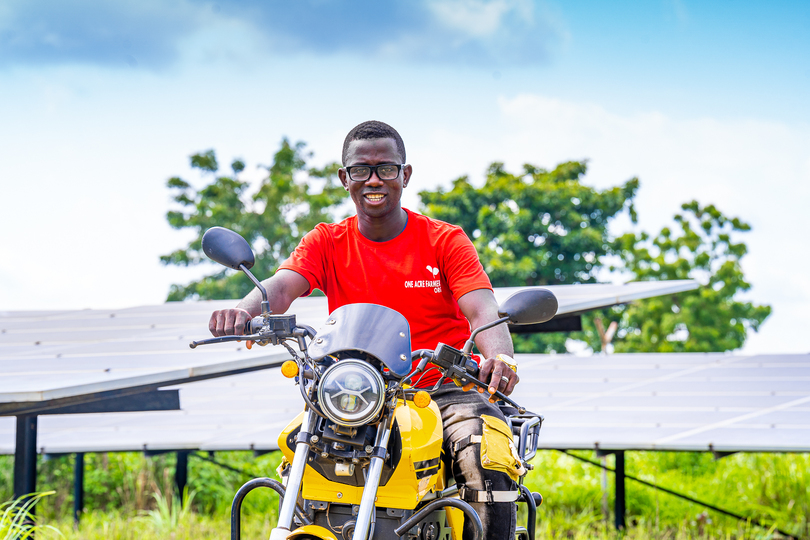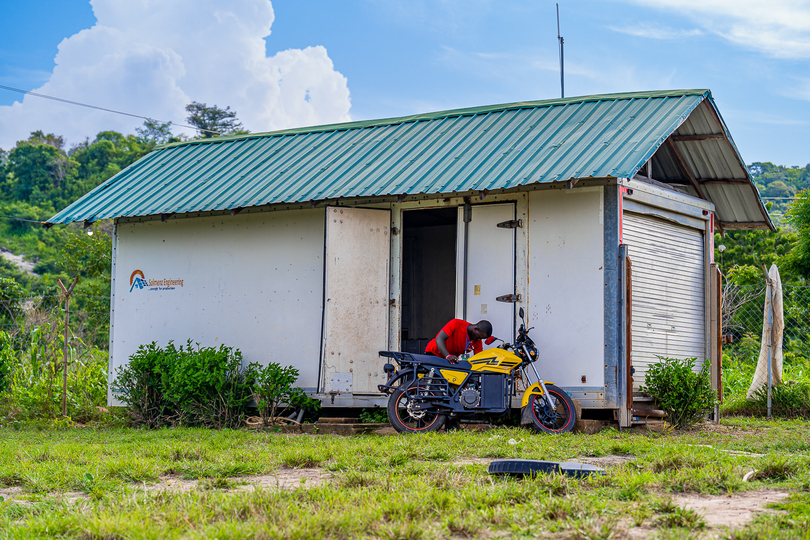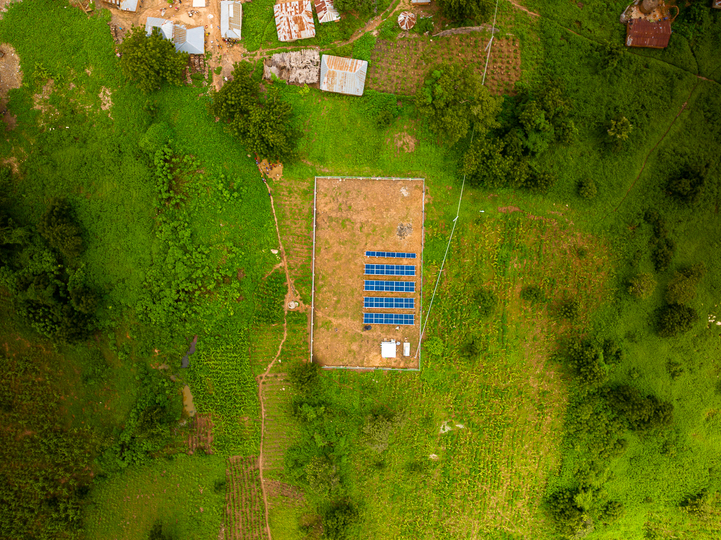Read in
This article was originally posted on The Energizing Agriculture Programme’s website on December 21, 2023.
One Acre Fund field officer Kabiru Adamu spends his days bumping his motorbike along the dirt roads surrounding his home in Gwam Village, Nigeria, stopping to inspect maize crops and advise farmers on how to make the most of their harvest. Since the removal of the federal government’s petrol subsidy, the fuel cost of reaching rural farmers with a fossil-fueled motorbike has risen threefold. Not only is fuel expensive in rural areas, it can also be hard to find: the nearest fueling station is an hour round trip from Gwam Village, and independent retailers closer to home add an additional margin on more convenient petrol. For One Acre Fund’s agriculture extension officers, daily petrol expenses have surged to NGN 1,600–2,000 today from NGN 400–600 in July 2022.

For decades, petrol motorbikes have been the tool of choice for plying Nigeria’s rutted and unforgiving rural roads, but the status quo is more costly to drivers in the post-subsidy era and emits more noise and pollution per mile than passenger cars. Although the rollback of the petrol subsidy and recent currency reforms could spur longer-term growth in Africa’s largest economy, Nigerians from Lagos to rural farms are feeling the effects of higher transportation costs. Data from the Nigerian Midstream and Downstream Petroleum Regulatory Authority suggests that petrol consumption has fallen by about 35 percent in the months since the subsidy removal.
Interest in electric mobility as a cheaper, greener alternative to fossil fuels is climbing with pump prices. Nigerian federal and state governments are looking to electric and compressed natural gas (CNG) vehicles to reduce fuel costs and greenhouse gas emissions. President Bola Tinubu announced a plan to deploy 100 electric buses at COP28. The Ogun State government has transitioned their bus fleet to CNG in the past year and is setting its sights on electrifying two- and three-wheeled vehicles next.
Renewably charged electric vehicles are saving drivers money and bolstering rural electricity system economics
Since May 2023, Adamu has reduced his fuel costs by 75 percent with a new electric motorbike charged by the solar minigrid powering his community. Adamu received his MAX M3 EV through a pilot project supported by the REA-RMI Energizing Agriculture Programme (EAP). It is an early proof point in the broader conversation Nigeria is having about how to solve the fuel price crisis crippling the economy.
The project is based on a collaborative business model forged in the EAP’s Agriculture-Energy Innovation Accelerator. The vehicles were developed and manufactured by MAX, a Nigerian mobility company. In Gwam Village, One Acre Fund offered two drivers the EVs on a lease-to-own basis, and Solmenz Engineering Limited provides pay-as-you-go charging via their preexisting minigrid system. A similar model is being tested in parallel with field officers employed by Babban Gona, who charge at minigrids operated by ACOB Lighting Ltd. and Konexa.
Adamu conveniently charges his electric two-wheeler (E2W) at a station near his home that is metered by the minigrid company. He saves time and money, and the electricity sales to the minigrid also support the energy system powering his community. The EAP Accelerator is piloting similar symbioses between energy providers and energy users in minigrid-connected communities across Nigeria.

RMI analysis shows that minigrid-charged two- and three-wheeled electric vehicles can compete with fossil-fueled alternatives at a range of energy costs, provided that the EVs drive enough miles per day for their operating cost advantage to overcome their higher upfront price compared with conventional vehicles. Adamu and his peers are driving the vehicles about 40 kilometers per day on average, a significant increase over the roughly 10 kilometers per day observed in a previous pilot where the EVs were rented out daily to local taxi drivers. In addition, the availability of a daytime discount on minigrid electricity not only enables Adamu to save more, but also directs his charging activities to coincide with hours when the minigrid’s solar panels are at peak production. Daytime charging both enhances the utilization of the minigrid’s solar capacity and ensures that the electric vehicle is charged with carbon-free electricity.
In addition to lower costs and easier refueling, Adamu is enjoying a quieter ride, with significantly less noise than internal combustion engines (ICEs), along with the convenience of a digital dashboard and the absence of gear shifts. “I do not see myself riding petrol bikes anymore, the E2W is easy to ride and more affordable to maintain”, he says. “In fact, I spend about 30–40 percent of what my colleagues riding ICE bikes spend on maintenance.”
By charging his EV at the local solar minigrid, Adamu is supporting the electricity system that serves his community. This is just one example of how electric mobility can have broader economic impacts. The E2W components were partially assembled by MAX and One Acre Fund technicians, thus building their capacity and demonstrating the potential to assemble locally at a larger scale in the future. In the parallel pilot featuring Babban Gona extension officers, the EAP helped a local entrepreneur set up a battery charging station in his shop. Leveraging reliable minigrid electricity, the entrepreneur now generates additional income from battery swap services.

Scaling benefits of e-mobility requires collaboration between public and private stakeholders
The removal of petrol subsidies in Nigeria has had a profound impact on rural farming households and agribusinesses, leading to increased transportation costs and reduced income due to heavy reliance on costly fossil fuels. EAP pilots are providing one example of how electric mobility can address these challenges in rural areas, presenting lower operation costs and environmental benefits. Prioritizing e-mobility can directly improve rural economies while positioning Nigeria to achieve Sustainable Development Goals 1, 2, 7 and 13. Deploying electric motorbikes in rural communities will empower field officers to deliver enhanced inputs and impart valuable agronomic practices to a larger number of farmers, thus improving livelihoods and contributing to increased food security in these areas (SDG 2).
To catalyze a vibrant e-mobility sector, implementing innovative models for charging and deploying EVs is crucial. Scaling up the success of Kabiru’s experience and testing other use cases require resolving challenges in several areas:
- Import logistics and duties. EV suppliers interviewed by RMI have cited customs value added tax and sundry duties at up to 36 percent of the value of vehicle components. Imported vehicles or parts are routinely stuck in Nigerian ports for weeks.
- Charging infrastructure. EV rollout must be accompanied by reliable charging infrastructure despite unreliable or nonexistent grid supplies.
- Financing the higher upfront costs of EVs: Tailored financial products are required to alleviate the heavy burden of the initial upfront cost faced by customers.
- After-sales service. Common ICE models are readily fixed by local mechanics with access to spare parts. EVs will be more difficult to fix until spare parts are readily available.
If accompanied by supportive policy, federal funds saved by discontinuing the petrol subsidy could enable significant progress toward each of these challenges fostering both environmental sustainability and economic growth. For instance, the government can invest in charging stations and supporting infrastructure including power and roads to facilitate the local assembly of EVs. In addition, the government can invest in bulk procurement for government fleets and provide vehicle financing or subsidies, thereby improving the EV landscape.
This is a call to action for stakeholders to support and scale initiatives such as the EAP that improve the well-being of rural communities and help achieve important development goals. The EAP team is actively tackling scaling challenges and testing novel models in rural and urban settings. Partners are invited to connect via email: eap@rmi.org.



